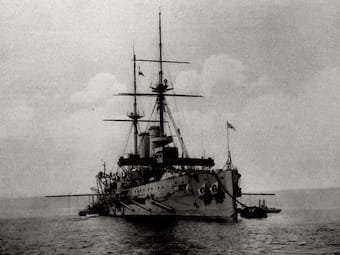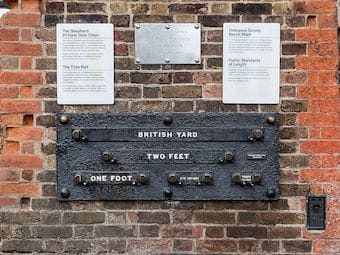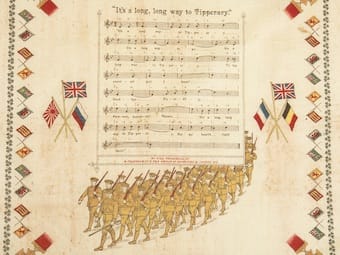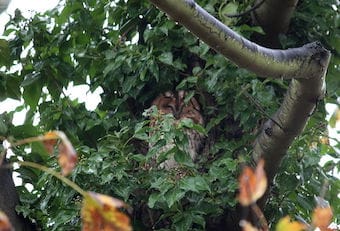541
When columnist ‘Alpha of the Plough’ was asked to select his most memorable moment of the Great War, he told the story of HMS Formidable.
Asked which event of the Great War had made the deepest impression on him, columnist ‘Alpha of the Plough’ recalled the fate of HMS Formidable, twice torpedoed by a German U-Boat during night-time exercises off the Devon coast on January 1st, 1915. The Captain, 34 officers and 512 crew died; 157 men were picked up from the water or made it ashore in two boats.
Picture: From the National Museum of the US Navy, via Wikimedia Commons. Licence: Public domain.. Source.
Posted October 30 2020
542
To Napoleon, the way that politicians in Paris had forced metric measurements on the public was a lesson in bad government.
Napoleon Bonaparte’s frustration at the way that metres and kilos were forced on the people of France following the Revolution of 1789 has often been quoted with grim amusement by those who lament the passing of yards and ounces. And yet the lesson he was teaching us has rarely been taken to heart, either by his critics or his admirers, though it applies in so many areas of our common life.
Picture: © Dietmar Rabich, Wikimedia Commons. Licence: CC BY-SA 4.0.. Source.
Posted October 29 2020
543
The modern match is ignited by friction, a simple idea but one which had not occurred to anyone until 1826, when a Stockton pharmacist dropped a stick.
Until 1826, lighting a fire, a candle or a pipe was not an easy business. Matches as we know them were in their infancy, a toilsome affair requiring a man to juggle little bottles of noxious chemicals and perhaps a pair of pliers. But that year, a merry pharmacist from Stockton-on-Tees called John Walker (1781-1859) liberated us from all this, and quite by accident.
Picture: © lvm15, Wikimedia Commons. Licence: CC BY-SA 2.0.. Source.
Posted October 25 2020
544
After one of the worst outrages in modern British history, Winston Churchill stood up in the House of Commons to label the Amritsar Massacre an act of terrorism.
On 13th April 1919, thousands of Sikhs crowded into the Jallianwala Bagh at Amritsar in the Punjab for a religious festival. Led by intelligence reports to believe that Bolshevik (communist) agitators were among them, General Reginald Dyer quietly shut the gates and gave the order to fire on the crowd. A year later, Secretary of State for War Winston Churchill rose in the Commons to deliver his verdict.
Picture: © Jmacleantaylor, Wikimedia Commons. Licence: CC-BY-SA 3.0.. Source.
Posted October 23 2020
545
The British Tommy’s fondness for ‘Tipperary’ exasperated some of his countrymen, but ‘Alpha of the Plough’ thought it showed proper English spirit.
‘There are some among us’ sighed Gardiner at the height of the Great War ‘who never will understand the English spirit.’ He was thinking of those who scolded the British Tommy for jostling to his fate with It’s a long way to Tipperary on his lips, while the Kaiser’s men marched in time to a noble Lutheran hymn — didn’t that just say it all? In a way, mused Gardiner, it did.
Picture: From the Auckland War Memorial Museum, Wikimedia Commons. Licence: CC BY-SA 4.0.. Source.
Posted October 22 2020
546
The mournful owl in her Sussex garden so troubled A. G. Gardiner’s friend that she rarely visited her house in the country.
Journalist A. G. Gardiner, better known by the pen-name of ‘Alpha of the Plough’, lived in the countryside, where he enjoyed the companionship of two familiar voices. One was the merry piping of the robin by day; the other was the hopeless sigh of the owl by night. ‘Where are the songs of spring’ the little fellow seemed to say ‘and the leaves of summer?’ But Gardiner refused to be borne along by Wol’s pessimism.
Picture: © Mark Kent, Wikimedia Commons. Licence: CC BY-SA 2.0.. Source.
Posted October 22 2020





